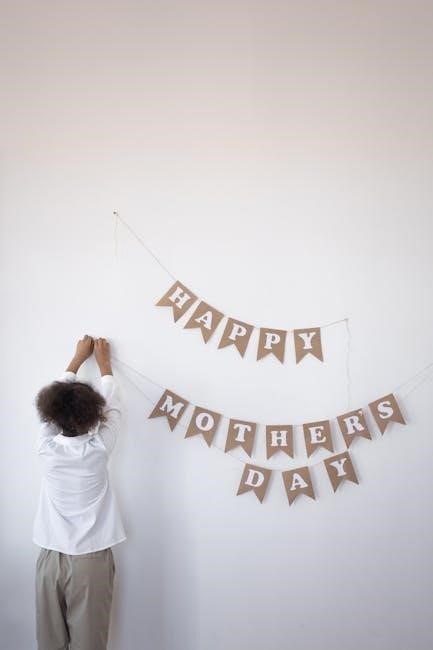The PDF version of Letters to a Young Poet preserves Rilke’s profound insights‚ offering accessible wisdom on creativity‚ solitude‚ and self-discovery‚ written to Franz Xaver Kappus between 1903 and 1908.
Overview of the Book
Letters to a Young Poet is a collection of ten letters written by Rainer Maria Rilke to Franz Xaver Kappus‚ a young officer cadet‚ between 1902 and 1908. Rilke‚ then only in his late twenties‚ offered profound advice on poetry‚ creativity‚ and life. The letters explore themes of solitude‚ suffering‚ and self-discovery‚ emphasizing the importance of authenticity in artistic expression. Widely regarded as a seminal work of literary guidance‚ the book remains a timeless source of inspiration for writers and artists. Its PDF version is popular today‚ making Rilke’s wisdom accessible to a global audience seeking deeper understanding of the creative process.
Historical Context of the Letters
The letters were written between 1902 and 1908‚ a transformative period in Rilke’s life. During this time‚ he transitioned from a struggling young poet to a mature artist‚ heavily influenced by his time with Auguste Rodin in Paris. Rilke’s correspondence with Franz Xaver Kappus began when Kappus‚ seeking guidance‚ sent his poetry for critique. The letters reflect Rilke’s own artistic struggles and philosophical evolution‚ offering insights into his views on creativity‚ solitude‚ and the human condition. This historical backdrop shapes the depth and sincerity of Rilke’s advice‚ making the letters a unique window into his development as a poet and thinker.
Significance of the PDF Version
The PDF version of Letters to a Young Poet has become a popular format for readers‚ offering easy access to Rilke’s timeless advice. Its digital form ensures wide dissemination‚ reaching a global audience and preserving the original text’s integrity. The PDF allows readers to highlight‚ annotate‚ and revisit key passages‚ enhancing engagement with Rilke’s profound insights. This format also complements the book’s enduring relevance‚ making it accessible to new generations of writers and thinkers. The convenience of the PDF has contributed to the work’s lasting popularity‚ ensuring that Rilke’s wisdom remains a vital resource for aspiring artists and intellectuals.

Author Background: Rainer Maria Rilke
Rainer Maria Rilke‚ a renowned 20th-century German poet‚ wrote Letters to a Young Poet at 26‚ offering profound advice on solitude‚ creativity‚ and self-discovery to Franz Xaver Kappus.
Rilke’s Early Life and Career
Rainer Maria Rilke was born in 1875 in Prague‚ then part of the Austro-Hungarian Empire. His early life was marked by a strained relationship with his parents‚ particularly his father‚ a military officer. Rilke’s poetic talent emerged early‚ and he attended the Academy for Trade and Commerce in Linz. By 1891‚ he moved to Munich to focus on writing‚ publishing his first works. His struggles in academia and personal life influenced his writing‚ shaping themes of isolation and introspection that later appeared in Letters to a Young Poet.
His Role as a Mentor to Young Artists
Rainer Maria Rilke’s role as a mentor emerged through his correspondence with Franz Xaver Kappus‚ a young officer cadet. Between 1903 and 1908‚ Rilke wrote ten letters offering guidance on poetry‚ creativity‚ and life. These letters‚ collected in Letters to a Young Poet‚ emphasize the importance of solitude‚ suffering‚ and self-discovery. Rilke encouraged Kappus to embrace his unique voice and find authenticity in his art. His mentorship extended beyond Kappus‚ influencing many through the published letters‚ which remain a timeless source of inspiration for aspiring writers and artists seeking to understand the depth of their creative calling.
Rilke’s Philosophical and Literary Influences
Rainer Maria Rilke’s work was deeply influenced by philosophical and literary traditions. His time with Auguste Rodin shaped his emphasis on craftsmanship and observation. Philosophers like Nietzsche and Kierkegaard‚ along with the Symbolist movement‚ inspired his exploration of existence and the human condition. Rilke’s correspondence with figures like Ellen Key and his immersion in diverse cultures enriched his perspective. These influences are reflected in Letters to a Young Poet‚ where he encourages authenticity and introspection‚ blending poetic insight with philosophical depth to guide young artists in their creative journeys.

Structure of the Letters
The collection contains ten letters written by Rilke between 1903 and 1908‚ offering a chronological progression of his thoughts on poetry‚ existence‚ and artistic dedication.
Number of Letters and Their Chronology
Rainer Maria Rilke wrote ten letters to Franz Xaver Kappus between 1903 and 1908‚ offering guidance on poetry‚ life‚ and artistic dedication. The correspondence began in 1903‚ with the majority of the letters composed by the end of 1905. Rilke‚ then 26‚ shared his evolving thoughts on creativity‚ solitude‚ and self-discovery. These letters‚ compiled in the PDF version‚ provide a chronological insight into Rilke’s mentorship and philosophical growth during this period. The letters are a testament to his deep engagement with Kappus‚ reflecting the intensity of his artistic and existential reflections during these transformative years.
Key Themes in the Correspondence
The letters explore themes of solitude‚ suffering‚ and self-discovery as essential for artistic growth. Rilke emphasizes the importance of embracing isolation to foster creativity and authenticity. He also highlights the role of suffering as a catalyst for profound art‚ urging Kappus to delve deeply into his experiences. Additionally‚ Rilke stresses the necessity of self-discovery‚ encouraging the young poet to understand his unique voice and purpose. These themes‚ central to Rilke’s philosophy‚ provide timeless guidance for writers and artists seeking to navigate the challenges of their craft. The PDF version captures these ideas‚ offering a concise yet profound exploration of artistic existence.
Evolution of Ideas Across the Letters
Rilke’s ideas evolve from practical advice to deeper philosophical reflections. Early letters focus on the discipline of writing and understanding one’s purpose. As the correspondence progresses‚ Rilke delves into themes of solitude‚ suffering‚ and the necessity of embracing life’s complexities. He encourages Kappus to observe the world intimately and find authenticity in his art. The letters also reveal Rilke’s growing emphasis on the transformative power of doubt and uncertainty‚ urging the young poet to “live the questions.” This progression reflects Rilke’s own maturation as a thinker and artist‚ offering a nuanced exploration of creativity and existence in the PDF compilation.

Key Themes Explored in the Letters
The letters explore solitude‚ suffering‚ and self-discovery‚ emphasizing the importance of embracing life’s complexities. Rilke interweaves these themes with poetic introspection and existential insights.
The Importance of Solitude for Creativity
Rilke emphasizes solitude as a catalyst for creativity‚ urging the young poet to embrace loneliness as a means to deepen self-awareness and artistic expression. He argues that solitude allows the artist to confront their inner world‚ fostering authenticity and depth in their work. Rilke advises Kappus to seek moments of isolation‚ where he can fully immerse himself in his experiences and emotions‚ untethered by external distractions. This theme is central to the letters‚ as Rilke believes that true creativity arises from the ability to observe and reflect on life’s complexities in silence and solitude. The PDF version highlights this idea as a cornerstone of his advice.
Embracing Suffering as a Catalyst for Art
Rilke profoundly explores the idea that suffering is not an obstacle but a vital catalyst for artistic creation. He writes that pain and struggles are essential for producing meaningful work‚ as they deepen the artist’s understanding of life. Rilke advises Kappus to endure suffering‚ viewing it as a transformative force that fosters growth and authenticity. The PDF version of the letters highlights Rilke’s belief that true art emerges from embracing‚ rather than escaping‚ life’s difficulties. Suffering‚ in his view‚ becomes a source of inspiration‚ urging the poet to confront and express the depths of human experience. This theme resonates throughout the correspondence.
The Role of Self-Discovery in Poetry
Rilke emphasizes the importance of self-discovery in the pursuit of poetic expression. He urges Kappus to explore his inner world‚ questioning and understanding his true self. The letters highlight that poetry emerges from authenticity‚ requiring the poet to delve into their unique experiences and emotions. Rilke advises against imitation‚ instead advocating for a deep inward journey to uncover one’s voice. The PDF version underscores this theme‚ revealing that self-discovery is not a static state but a continuous process. Through this introspection‚ the poet gains clarity and depth‚ essential for creating work that resonates with universal truths and personal sincerity.

Historical Context of the Letters
The letters were written between 1903 and 1908‚ primarily in Germany‚ with Rilke later moving to Paris. They reflect his evolving thoughts and environment during this period.
The Time Period When the Letters Were Written
The letters were composed between 1903 and 1908‚ a transformative period in Rilke’s life. During this time‚ he moved from Germany to Paris‚ where he immersed himself in artistic circles‚ particularly under the influence of Auguste Rodin. This era marked significant personal and creative growth for Rilke‚ as he developed his unique poetic style and philosophical outlook. The letters reflect his evolving thoughts on art‚ solitude‚ and self-discovery‚ offering a glimpse into the intellectual and cultural climate of early 20th-century Europe. This period was pivotal in shaping Rilke’s identity as a poet and mentor‚ influencing his advice to Kappus.
Rilke’s Relationship with Franz Xaver Kappus
Franz Xaver Kappus‚ a young officer and aspiring poet‚ initiated the correspondence with Rilke in 1902‚ seeking guidance on his writing and life choices. Rilke‚ though only 26‚ responded with depth and empathy‚ forming a mentorship that lasted until 1908. Kappus‚ feeling stifled by his military upbringing‚ found solace in Rilke’s advice‚ which emphasized self-discovery and artistic authenticity. Their exchange was deeply personal‚ with Rilke sharing insights on creativity‚ solitude‚ and the struggles of artistic life. The letters reveal a profound connection‚ highlighting Rilke’s ability to inspire and guide a younger writer navigating his own identity and aspirations.
Social and Cultural Influences on the Letters
The letters reflect the societal tensions of early 20th-century Europe‚ where traditional values clashed with emerging modernity. Rilke’s advice to Kappus often addressed the pressures of a conventional military career versus the pursuit of artistic passion. The influence of Rodin and other artists shaped Rilke’s emphasis on discipline and solitude. Additionally‚ the cultural shifts of the time‚ including the rise of individualism and the search for meaning‚ are evident in Rilke’s encouragement of self-discovery. These factors created a unique backdrop for the correspondence‚ making the letters a timeless reflection on balancing societal expectations with personal artistic expression.

The Influence of Other Artists on Rilke
Auguste Rodin’s discipline and artistic philosophy deeply influenced Rilke‚ shaping his advice on creativity and solitude in the letters. Other artists’ perspectives also enriched his mentorship.
Auguste Rodin’s Impact on Rilke’s Work
Auguste Rodin’s influence on Rainer Maria Rilke was transformative. While working as Rodin’s secretary in Paris‚ Rilke absorbed the sculptor’s emphasis on discipline and observing life deeply. Rodin’s approach to art as a rigorous‚ all-consuming practice resonated with Rilke‚ who adopted these principles in his own writing. This period marked a shift in Rilke’s style‚ as he began to embrace simplicity and clarity‚ reflecting Rodin’s belief in stripping art to its essence. These lessons are evident in the Letters to a Young Poet‚ where Rilke advises the young writer to seek depth and authenticity in their work. The time spent with Rodin also instilled in Rilke a respect for craftsmanship‚ which he passed on through his letters‚ urging Kappus to dedicate himself fully to his art. This mentorship not only shaped Rilke’s own creative process but also informed the wisdom he shared with others.
Rilke’s Correspondence with Other Notable Figures
Beyond Franz Xaver Kappus‚ Rilke engaged in meaningful exchanges with other influential figures‚ such as Ellen Key and Lou Andreas-Salomé. These correspondences deeply influenced his intellectual and artistic growth. Ellen Key‚ a Swedish feminist and writer‚ discussed aesthetics and identity‚ while Lou Andreas-Salomé‚ a psychoanalyst and philosopher‚ explored themes of psyche and creativity. Rilke’s interactions with these figures enriched his understanding of art and human experience‚ which he later conveyed in Letters to a Young Poet. Their discussions on authenticity and emotional depth resonated in his advice to Kappus‚ emphasizing the importance of introspection and sincerity in artistic expression.
How These Influences Shaped the Letters
Rilke’s exchanges with notable figures significantly shaped his advice in Letters to a Young Poet. Conversations with Ellen Key about identity and Lou Andreas-Salomé’s insights into human psychology influenced his emphasis on introspection. Auguste Rodin’s mentorship instilled in Rilke the value of disciplined creativity‚ which he passed on to Kappus. These interactions refined his thoughts on solitude‚ suffering‚ and artistic authenticity. By integrating these diverse perspectives‚ Rilke crafted letters that were both deeply personal and universally resonant‚ offering guidance that transcended poetry to touch on the essence of living and creating with genuine depth and purpose.

Personal Reflections and Advice
Rilke’s letters offer deeply personal reflections‚ urging young writers to embrace solitude‚ suffering‚ and self-discovery. He advises patience‚ authenticity‚ and finding one’s true voice through persistent creative effort.
Rilke’s Views on the Challenges of Being a Poet
Rilke emphasizes the immense emotional and intellectual demands of poetry‚ urging poets to embrace solitude and suffering as catalysts for authentic expression. He warns against superficiality‚ advocating instead for a deep inward journey to tap the essence of art. Rilke advises patience and persistence‚ noting that true poetry emerges from a profound connection to life’s complexities. He discourages external validation‚ insisting that a poet’s worth is measured by the depth of their inner experience and the honesty of their craft‚ rather than public acclaim. This perspective underscores his belief in the transformative power of poetry.
Practical Advice for Young Writers
Rilke advises young writers to cultivate self-awareness‚ urging them to identify the reasons behind their creative impulses. He emphasizes the importance of solitude‚ suggesting it as a means to achieve inner clarity and authenticity. Rilke also advises against imitating others‚ advocating instead for a unique voice rooted in personal experience. He recommends immersing oneself in life’s complexities to gather material for writing. Rilke’s guidance underscores the significance of patience and perseverance‚ encouraging writers to trust their intuition and resist the urge for immediate recognition. His advice remains timeless‚ offering a foundation for authentic and meaningful artistic expression.
Encouraging Authenticity in Artistic Expression
Rilke championed authenticity‚ urging writers to embrace their unique voice and experiences. He advised against superficiality‚ emphasizing the importance of writing from a place of necessity and genuine emotion. Rilke discouraged imitation‚ encouraging young poets to explore their individuality rather than conform to external expectations. He believed true artistry emerges when one taps into their inner truth‚ unaffected by comparison or external validation. This philosophy fosters a deeper connection between the artist and their work‚ ensuring authenticity that resonates with others. Rilke’s words continue to inspire writers to stay true to their creative core and express themselves honestly.

Legacy of “Letters to a Young Poet”
The timeless advice in Letters to a Young Poet continues to inspire writers globally. Its PDF version ensures accessibility‚ preserving Rilke’s enduring influence on modern literature and creativity.
Impact on Modern Poetry and Literature
Rilke’s Letters to a Young Poet has profoundly shaped modern poetry and literature. Its themes of solitude‚ suffering‚ and self-discovery resonate deeply‚ influencing countless writers. The PDF format ensures accessibility‚ making Rilke’s timeless wisdom available globally‚ inspiring contemporary poets to embrace authenticity and depth in their work‚ while fostering a culture of introspective creativity.
Popularity of the PDF Format Today
The PDF version of Letters to a Young Poet remains highly popular due to its ease of access and readability. Its digital format allows global sharing and convenient downloading‚ making Rilke’s wisdom widely accessible. The PDF preserves the original text’s integrity‚ ensuring that the depth and nuance of Rilke’s advice are maintained. This format is particularly favored by students‚ writers‚ and scholars due to its portability and compatibility across devices. The enduring relevance of Rilke’s insights continues to drive the demand for the PDF‚ solidifying its place as a cherished resource for aspiring artists and thinkers worldwide.
Reception and Reviews of the Book
Letters to a Young Poet has garnered widespread acclaim for its timeless wisdom and lyrical prose. Readers and critics alike praise Rilke’s deeply personal and philosophical advice‚ which resonates across generations. The book is often described as a essential guide for anyone seeking to understand the creative process. Its accessibility in PDF format has further amplified its reach‚ making it a beloved resource for writers‚ artists‚ and thinkers. The letters’ emotional depth and universal themes continue to inspire‚ ensuring the work’s enduring popularity and critical acclaim in both print and digital forms.

Psychological and Philosophical Insights
Rilke’s letters explore the human condition‚ emphasizing solitude‚ suffering‚ and self-discovery as catalysts for artistic expression‚ offering profound reflections on existence and creativity.
Rilke’s Views on the Human Condition
Rilke’s letters reveal his deep contemplation of human existence‚ emphasizing the struggle for meaning and connection. He advocates embracing life’s complexities‚ viewing suffering as a transformative force. Rilke urges introspection and authenticity‚ encouraging individuals to embrace their uniqueness. His philosophy centers on the belief that growth emerges from confronting inner turmoil‚ fostering a profound understanding of self and the world. This perspective offers solace and guidance‚ resonating with readers seeking to navigate life’s challenges with resilience and grace. Rilke’s insights remain timeless‚ providing a philosophical framework for personal and artistic growth.
Exploring the Intersection of Poetry and Philosophy
Rilke seamlessly blends poetry and philosophy‚ creating a unique dialogue that enriches both art forms. He views poetry as a medium to explore existential questions‚ suggesting that true art emerges from profound introspection and emotional depth. Rilke’s letters emphasize the poet’s role as a seeker of truth‚ transcending mere aesthetics to delve into the human condition. This intersection of poetry and philosophy encourages readers to reflect on their own existence‚ illustrating how art can serve as a mirror for self-discovery. Rilke’s approach underscores the transformative power of both poetry and philosophy‚ offering a holistic perspective on life and creativity.
The Concept of “Living the Questions”
Rilke introduces the transformative idea of “living the questions‚” urging patience and immersion in uncertainty. Rather than seeking quick answers‚ he suggests embracing the journey of inquiry‚ allowing questions to deepen and evolve. This concept encourages young poets to trust the organic process of growth‚ where doubts and mysteries become catalysts for creative and personal development; By living the questions‚ one gains profound insights and authenticity‚ essential for meaningful art. Rilke’s philosophy emphasizes the value of enduring the unknown‚ fostering a mindset that prioritizes depth over resolution‚ and allowing life’s complexities to enrich both the individual and their work.

Comparison with Other Similar Works
Letters to a Young Poet stands out among comparable works for its intimate‚ deeply personal tone and philosophical depth‚ offering unique perspectives on art and existence that resonate universally.
Similar Letters and Essays by Other Authors
Other authors have penned similar works offering advice to young artists. Virginia Woolf’s A Letter to a Young Poet (1932) provides guidance on writing and creativity‚ echoing Rilke’s emphasis on authenticity. Similarly‚ essays by poets like T.S. Eliot and E.M. Forster explore the challenges of artistic expression. These works‚ while unique in style‚ share a common goal of inspiring emerging writers. Rilke’s letters‚ however‚ stand out for their deeply personal and philosophical tone‚ making them a unique contribution to the genre. These comparable pieces highlight the timeless relevance of mentorship in the creative process‚ resonating across generations of artists.
Unique Aspects of Rilke’s Approach
Rilke’s approach in Letters to a Young Poet is distinct for its intense focus on the interior life of the artist. Unlike other mentors‚ Rilke avoids offering practical advice‚ instead emphasizing the importance of solitude‚ suffering‚ and self-discovery. His letters are deeply philosophical‚ encouraging the young poet to embrace uncertainty and delve into the essence of existence. This introspective guidance sets Rilke apart‚ providing not just literary advice but a blueprint for living a meaningful life. His unique perspective has made the letters timeless‚ transcending traditional mentorship to become a source of inspiration for artists and non-artists alike. His words resonate deeply.
How “Letters to a Young Poet” Stands Out
Letters to a Young Poet stands out for its lyrical depth and universal relevance. Rilke’s intimate‚ poetic prose transcends traditional advice‚ offering profound insights into creativity and existence. The PDF version preserves the timeless essence of his words‚ making them accessible to modern readers. Unlike other mentorship texts‚ Rilke’s letters avoid prescriptive guidance‚ instead fostering a deeper understanding of the artistic process. His emphasis on solitude‚ suffering‚ and self-discovery resonates across generations‚ appealing to anyone seeking authenticity in their pursuits. This unique blend of philosophy and poetry ensures the letters remain a timeless source of inspiration‚ surpassing conventional literary advice. Their enduring appeal lies in their ability to connect with readers on a deeply personal level.
Rilke’s timeless advice in “Letters to a Young Poet” remains a cherished resource‚ offering insights into solitude‚ suffering‚ and authenticity‚ inspiring young poets and artists universally.
Final Thoughts on the Letters’ Relevance Today
Rilke’s Letters to a Young Poet endure as timeless wisdom for modern creators. The PDF format ensures accessibility‚ spreading his insights on solitude‚ suffering‚ and authenticity‚ resonating deeply with today’s artists seeking meaningful expression. His emphasis on self-discovery and the necessity of living with questions continues to inspire‚ transcending generations and mediums. The letters’ relevance remains undiminished‚ offering a profound guide for navigating the challenges of artistic pursuit and personal growth in an ever-changing world.
Encouragement for Aspiring Writers
Rilke’s Letters to a Young Poet offer powerful encouragement for aspiring writers‚ urging them to embrace their unique voice and find authenticity. The PDF version highlights his belief in the importance of patience‚ solitude‚ and living deeply to nurture creativity. Rilke advises writers to explore their inner world and trust the process‚ rather than seeking external validation. His words inspire resilience and dedication‚ reminding writers that true art emerges from profound personal experience and introspection. This timeless advice continues to motivate writers to stay true to their vision and pursue their craft with passion and integrity.
The Timeless Appeal of Rilke’s Advice
Rilke’s advice in Letters to a Young Poet remains universally relevant‚ transcending time and disciplines. The PDF version captures his emphasis on authenticity‚ self-discovery‚ and embracing life’s complexities. His words resonate with anyone seeking creative fulfillment‚ encouraging introspection and patience. Rilke’s philosophy on solitude and suffering as catalysts for art continues to inspire modern readers. The accessibility of the PDF format ensures his timeless wisdom reaches a global audience‚ making it a cherished resource for writers‚ artists‚ and thinkers alike. His insights endure as a testament to the enduring power of genuine artistic expression and personal growth.